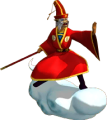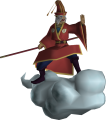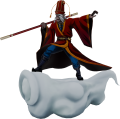Qitian Dasheng: Difference between revisions
No edit summary |
No edit summary |
||
| (11 intermediate revisions by 3 users not shown) | |||
| Line 1: | Line 1: | ||
{{about|the Demon | {{about|the Demon and non-party member Persona|Ryuji Sakamoto's Persona in ''Persona 5''|[[Seiten Taisei (Persona)]]}} | ||
{{Infobox Demon | {{Infobox Demon | ||
|image=<gallery> | |image=<gallery> | ||
SMT1 SFC Wu Kong Artwork.png|SMT1 | SMT1 SFC Wu Kong Artwork.png|SMT1 | ||
DeSum | DeSum Qitian Dasheng Artwork.png|DeSum | ||
SH1 Wu Kong Artwork.png|SH1 | SH1 Wu Kong Artwork.png|SH1 | ||
P3 Seiten Taisei Artwork.png|P3 | P3 Seiten Taisei Artwork.png|P3 | ||
| Line 21: | Line 21: | ||
==Profile== | ==Profile== | ||
===Origin=== | ===Origin=== | ||
''Seiten Taisei'' is the Japanese pronunciation of the Chinese term ''Qítiān Dàshèng'' (齊天大聖){{Note|Simplified Chinese: 齐天大圣; Japanese shinjitai: 斉天大聖}} meaning "Great Sage, Heaven's Equal", a title claimed by [[wikipedia:Sun Wukong|Sun Wukong]], one of the main characters of the 16th century Chinese novel ''[[wikipedia:Journey to the West|Journey to the West]]''. | ''Seiten Taisei'' is the Japanese pronunciation of the Chinese term ''Qítiān Dàshèng'' ({{Translit|zh-Hant|齊天大聖|hidelabel=y}}){{Note|Simplified Chinese: {{Translit|zh-Hans|齐天大圣|hidelabel=y}}; Japanese shinjitai: {{Translit|ja|斉天大聖|hidelabel=y}}}} meaning "Great Sage, Heaven's Equal", a title claimed by [[wikipedia:Sun Wukong|Sun Wukong]], one of the main characters of the 16th century Chinese novel ''[[wikipedia:Journey to the West|Journey to the West]]''. | ||
===Design=== | ===Design=== | ||
| Line 33: | Line 33: | ||
|smt1= | |smt1= | ||
|smt2= | |smt2= | ||
|smt3=Qitian Dasheng was supposedly born from rock. He wreaked havoc throughout the land and was punished by Buddha, but was eventually saved by a monk named Tang | |smt3='''PS2 Release:'''<br/>Sun Wu Kong was supposedly born from rock. He wreaked havoc throughout the land and was punished by Buddha, but was eventually saved by a monk named Santsang. | ||
---- | |||
'''HD Remaster:'''<br/>Qitian Dasheng was supposedly born from rock. He wreaked havoc throughout the land and was punished by Buddha, but was eventually saved by a monk named Tang Sanzang. | |||
|smtsj= | |smtsj= | ||
|smt4= | |smt4= | ||
| Line 56: | Line 58: | ||
==Nomenclature== | ==Nomenclature== | ||
Qitian Dasheng literally means "great sage, heaven's equal" and is a title Sun Wukong gives to himself in ''Journey to the West''. ''Seiten Taisei'' is the Sino-Japanese reading of the same characters. | |||
His given name Wukong{{Note|{{Translit|zh|悟空|悟空|Wùkōng}}}} means "awakened to emptiness". His surname Sun{{Note|{{Translit|zh|孫|孫|Sūn}}}} literally means "grandson", but is a pun on a homophonous character used in one of the words for a macaque.{{Note|{{Translit|zh|猢狲|猢猻|húsūn}}}} | |||
{{Names | {{Names | ||
|en=Wu Kong{{Exp App|SMT1|SMT3NM|SMT4|SH1|DDSAT1|DeSu2}}<br/>Seiten Taisei{{Exp App|P3|P4|PQ1|DeSu1}}<br/>Qitian Dasheng{{Exp App|SMT3HD|P3R}} | |en=Wu Kong{{Exp App|SMT1|SMT3NM|SMT4|SH1|DDSAT1|DeSu2}}<br/>Seiten Taisei{{Exp App|P3|P4|PQ1|DeSu1}}<br/>Qitian Dasheng{{Exp App|SMT3HD|P3R}} | ||
|ja=セイテンタイセイ ''Seitentaisei''<br/>斉天大聖{{Exp App|SMT1|plat1=MCD}} ''Seitentaisei''<br/>ソンゴクウ{{Exp App|DCBR|DCW|DCLD|DCFI}} ''Songokuu'' | |ja=セイテンタイセイ ''Seitentaisei''<br/>斉天大聖{{Exp App|SMT1|plat1=MCD}} ''Seitentaisei''<br/>ソンゴクウ{{Exp App|DCBR|DCW|DCLD|DCFI}} ''Songokuu'' | ||
|jaM=Seiten Taisei. Japanese pronunciation of the epithet 齊天大聖.<br/>Kanji rendering of the above.<br/>Son Gokū. Japanese pronunciation of the given name 孫悟空 (Sūn Wùkōng | |jaM=Seiten Taisei. Japanese pronunciation of the epithet 齊天大聖.<br/>Kanji rendering of the above.<br/>Son Gokū. Japanese pronunciation of the given name 孫悟空 (Sūn Wùkōng). | ||
|zhS= 齐天大圣 ''Qítiān Dàshèng'' | |zhS= 齐天大圣 ''Qítiān Dàshèng'' | ||
|zhSM=Qitian Dasheng. Chinese epithet meaning "great sage, equal of heaven". | |zhSM=Qitian Dasheng. Chinese epithet meaning "great sage, equal of heaven". | ||
| Line 78: | Line 83: | ||
==Gallery== | ==Gallery== | ||
<gallery> | <gallery> | ||
SMT1 PS | SMT1 PS Wu Kong Sprite.png|Sprite of Wu Kong from the PlayStation version of {{Link|Game|SMT1}} | ||
SMT1 MCD | SMT1 MCD Wu Kong Sprite.png|Sprite of Wu Kong from the Mega-CD version of {{Link|Game|SMT1}} | ||
PQ1 Seiten Taisei Render.png| Render from {{link|game|PQ1}} | PQ1 Seiten Taisei Render.png| Render from {{link|game|PQ1}} | ||
File:P4G Seiten Taisei Model.png|Model of Seiten Taisei from ''{{link|game|p4g}}''. | File:P4G Seiten Taisei Model.png|Model of Seiten Taisei from ''{{link|game|p4g}}''. | ||
Latest revision as of 21:28, 19 October 2024
Qitian Dasheng, also known as Wu Kong and Seiten Taisei, is a Demon in the Megami Tensei franchise.
Profile
Origin
Seiten Taisei is the Japanese pronunciation of the Chinese term Qítiān Dàshèng (齊天大聖)[a] meaning "Great Sage, Heaven's Equal", a title claimed by Sun Wukong, one of the main characters of the 16th century Chinese novel Journey to the West.
Design
Most of Seiten Taisei's designs in the Megami Tensei franchise have the character 斉 ("Equal") on his clothing, an allusion to his claim to be equal to heaven.
Gameplay
- For complete gameplay information, see Gameplay:Qitian Dasheng.
Compendium
| Compendium Entries | |
|---|---|
| Shin Megami Tensei III: Nocturne |
PS2 Release: Sun Wu Kong was supposedly born from rock. He wreaked havoc throughout the land and was punished by Buddha, but was eventually saved by a monk named Santsang. HD Remaster: |
| Persona 2: Innocent Sin | Another name for Sun Wukong, companion to Sanzang Fashi in Journey to the West. |
| Persona 3 Reload | Also known as "Sun Wukong", he was supposedly born from a rock. After wreaking havoc, he was punished by Buddha, but was eventually saved by a monk named Santsang. |
| Persona 4 Golden | Sun Wu Kong was supposedly born from a rock. He wreaked havoc and was punished by Buddha, but was eventually saved by a monk named Santsang. |
| Persona Q: Shadow of the Labyrinth |
Sun Wu Kong was supposedly born from a rock. He wreaked havoc and was punished by the Buddha, but he was eventually saved by a monk named Santsang. |
Nomenclature
Qitian Dasheng literally means "great sage, heaven's equal" and is a title Sun Wukong gives to himself in Journey to the West. Seiten Taisei is the Sino-Japanese reading of the same characters.
His given name Wukong[b] means "awakened to emptiness". His surname Sun[c] literally means "grandson", but is a pun on a homophonous character used in one of the words for a macaque.[d]
| Language | Name | Meaning |
|---|---|---|
| Wu Kong Shin Megami Tensei III: Nocturne Maniax Shin Megami Tensei IV Devil Summoner: Soul Hackers Digital Devil Saga: Avatar Tuner Devil Survivor 2 Seiten Taisei Persona 4 Persona Q: Shadow of the Labyrinth Devil Survivor Qitian Dasheng Persona 3 Reload | ||
| セイテンタイセイ Seitentaisei 斉天大聖 Seitentaisei ソンゴクウ Devil Children White Book Devil Children Light Book and Dark Book Devil Children Fire Book and Ice Book Songokuu |
Seiten Taisei. Japanese pronunciation of the epithet 齊天大聖. Kanji rendering of the above. Son Gokū. Japanese pronunciation of the given name 孫悟空 (Sūn Wùkōng). | |
| 齐天大圣 Qítiān Dàshèng | Qitian Dasheng. Chinese epithet meaning "great sage, equal of heaven". | |
| 齊天大聖 Qítiān Dàshèng | Qitian Dasheng. Chinese epithet meaning "great sage, equal of heaven". | |
| 제천대성 Jecheondaeseong | Jecheon Daeseong. Korean pronunciation of the epithet 齊天大聖. | |
Gallery
-
Sprite of Wu Kong from the PlayStation version of Shin Megami Tensei
-
Sprite of Wu Kong from the Mega-CD version of Shin Megami Tensei
-
Render from Persona Q: Shadow of the Labyrinth
-
Model of Seiten Taisei from Persona 4 Golden.
-
Model of Qitian Dasheng from Persona 3 Reload.
Notes
- ↑ Simplified Chinese: 齐天大圣; Japanese shinjitai: 斉天大聖
- ↑ Simplified Chinese: 悟空, Traditional Chinese: 悟空, romanized Wùkōng
- ↑ Simplified Chinese: 孫, Traditional Chinese: 孫, romanized Sūn
- ↑ Simplified Chinese: 猢狲, Traditional Chinese: 猢猻, romanized húsūn
- Pages created from boilerplates
- Demons in Shin Megami Tensei (Game)
- Demons in Shin Megami Tensei II
- Demons in Shin Megami Tensei if...
- Demons in Shin Megami Tensei III: Nocturne
- Demons in Shin Megami Tensei III: Nocturne Maniax
- Demons in Shin Megami Tensei: Strange Journey
- Demons in Shin Megami Tensei: Strange Journey Redux
- Demons in Shin Megami Tensei IV
- Demons in Shin Megami Tensei IV: Apocalypse
- Demons in Shin Megami Tensei V
- Demons in Shin Megami Tensei: Imagine
- Demons in Shin Megami Tensei: Liberation Dx2
- Beasts in Last Bible III
- Demons in Majin Tensei II: Spiral Nemesis
- Demons in Ronde
- Demons in Shin Megami Tensei: Devil Summoner
- Demons in Devil Summoner: Soul Hackers
- Personas in Persona 3
- Personas in Persona 3 FES
- Personas in Persona 3 Portable
- Personas in Persona 3 Reload
- Personas in Persona 4 Golden
- Personas in Persona Q: Shadow of the Labyrinth
- Demons in Devil Children Black Book and Red Book
- Demons in Devil Children White Book
- Demons in Digital Devil Saga: Avatar Tuner
- Demons in Devil Survivor (Game)
- Demons in Devil Survivor: Overclocked
- Demons in Shin Megami Tensei Trading Card: Card Summoner


